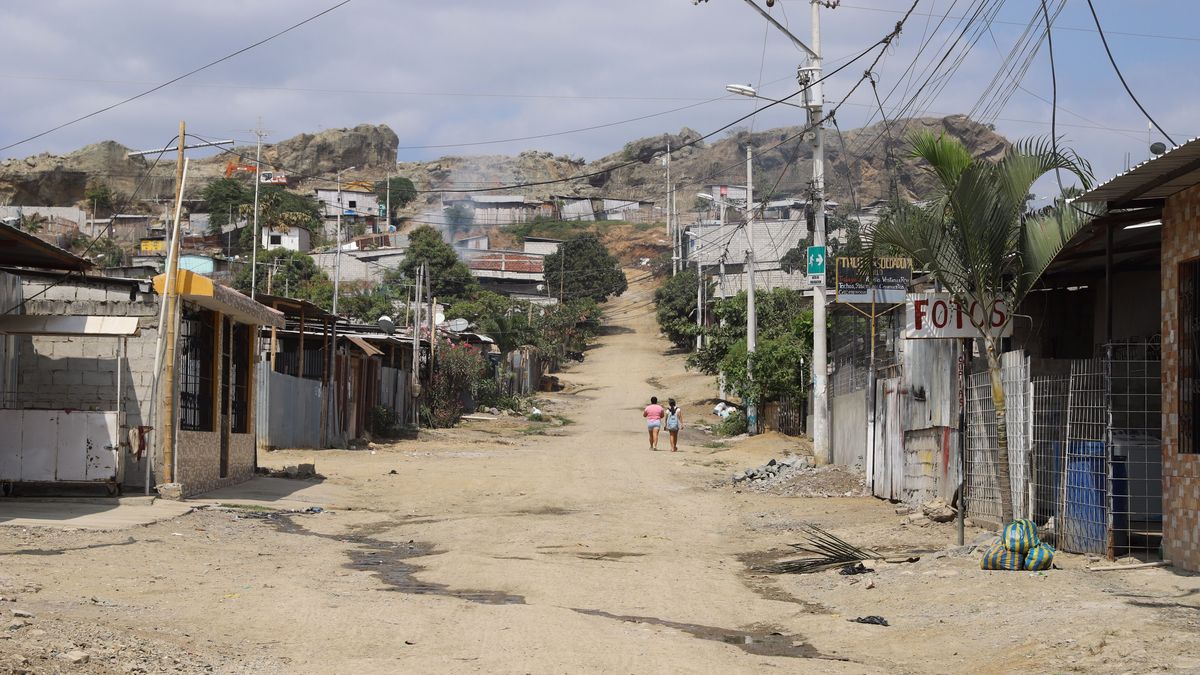mount sinai it is a hill with 55 settlements irregular groups that grew behind the prosperous Ecuadorian port, involved in a bloody spiral that has left 861 homicides so far this year, 32.5% of all cases registered in Ecuador.
Half a million people survive on the 9,300 hectares (100 km2) of the hill. without basic services, according to the municipal census of Guayaquil (2.8 million inhabitants). Only in City of God 40,000 poor people are squeezed into half-finished cane or prefabricated houses, so narrow that the bathrooms are outside the buildings.
The first to settle in this place were evangelical protestants that gave it the name of City of God, the same as the famous favela of Brazil who portrayed the cinema in 2002.
Here “every little house has Septic tank. We have made an effort to put the cement poles for the light; four poles in the street cost us 200 dollars,” says Marisol Chávez, a 40-year-old neighborhood leader who lives in a room with two beds together.
“We almost have nothing and we suffer a lot” in Ciudad de Dios, he abbreviates. She arrived at the hill in 2019 expelled from another irregular settlement. Here “there was nothing, pure undergrowth, dirt, there were only small trees with thorns that stuck to one,” she recalls.
Housing overcrowding in Guayaquil (14.6%) exceeds the national average (9.6%), according to the statistical authority of Ecuador, INEC. Poverty (20.1%) is also higher in the main port than in the rest of the country (16.7%).
City of God Guayaquil Ecuador
In Ciudad de Dios, 40,000 poor people are squeezed into half-finished cane or prefabricated houses.
Photo: Carlos Barros/ The Universe
“Poverty trap” in Ecuador’s largest city
City of God also does not have drinking water. Tanker trucks ascend the uncovered roads. A 55-gallon tank is worth 0.75 cents on the dollar, while in the rich sector of the lace the cubic meter of drinking water (264 gallons) costs 0.72 cents.
Poverty, overcrowding, lack of basic services and violence make up what UN Habitat call one “poverty trap”, from which it is difficult to escape. “We live trapped, leaving my house is going to pay rent and there is no money,” says Rosa Obando, who arrived here 15 years ago.
The criminal gangs they stretched out their arms to the crowded Mount Sinai. “Housing guarded,” reads a sign. The phrase is an intimidating warning for “those who owe money to The Choneros“, one of the 26 criminal organizations operating in Ecuador.
The gang members extort or “vaccinate” the communities to guarantee them security, but in reality it is the cost they must pay to live. In a few days they will go from house to house charging “two dollars,” one of the faction’s chiefs warned them, according to one of the inhabitants who reserved it.
Gangs use young people as cheap labor. They “are a hundred times more likely to be trapped in drug trafficking,” says César Cárdenas, director of the Observatory of Public Services of Guayaquil
A mountain with a narco past
Before the first invasions, Mount Sinai was a surface of private and state land where a drug trafficker had also built his hacienda, says the architect and urban planner Rosa Rada.
With the layout of the Perimeter road, which connects the industrial zone with the port, the hill began to “urbanize” in 1984.
To get to the center of Guayaquil, the residents of Ciudad de Dios must walk about half an hour to the nearest road and take public transportation, on journeys that can take up to an hour and a half.
Schools are also far away. During the covid-19 pandemic the children received one or another class on blackboards and tables installed in dusty patios.
According to him Ministry of Urban Development and Housing, a third of the surface of Guayaquil is irregularly inhabited by rural migrants who in many cases were deceived by land traffickers. Local authorities plan to legalize 8,000 homes in a progressive regularization plan.
Without housing “there is no life project nor (can) plan a future,” says the head of the Observatory. In City of God hardly anyone will touch the sky with their hands.
Source: Ambito
David William is a talented author who has made a name for himself in the world of writing. He is a professional author who writes on a wide range of topics, from general interest to opinion news. David is currently working as a writer at 24 hours worlds where he brings his unique perspective and in-depth research to his articles, making them both informative and engaging.




